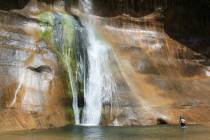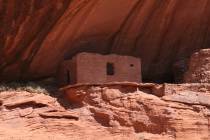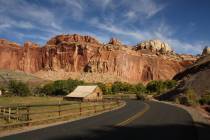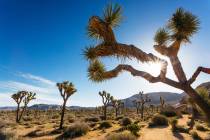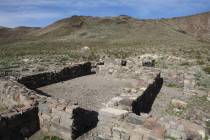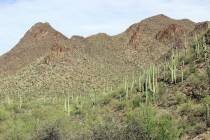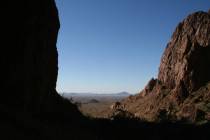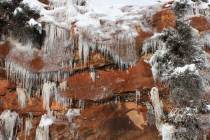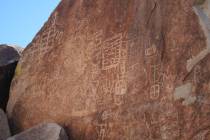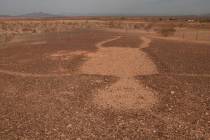Vultures snatch spotlight at Grand Canyon show
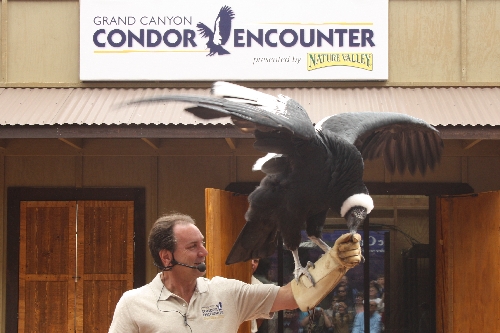
Many people know that the California condor is the largest bird that sailed the spacious skies of North America in modern history and that the huge bird nearly became extinct. The bird’s future is brighter now but remains so rare that few Americans have ever seen one, even in a zoo.
Now it’s possible to see two kinds of condors at one of their natural habitats: the Grand Canyon. For several years, lucky visitors have occasionally spied the great birds restored to the wild after successful captive breeding programs. Now there’s also a way to see a condor pretty much face-to-face, and with more certainty, through the Grand Canyon Condor Encounter at the Grand Canyon National Geographic visitor center, a mile south of the park’s main entrance on the south rim.
Joe Krathwohl, who has dedicated more than 30 years of his life to working with birds, doesn’t have one of the still-endangered and elaborately protected California condors; his star guest is its close relative: the Andean condor, itself a spectacular bird. And he’ll also introduce you to some of the other especially interesting avians sometimes seen in this part of the world, including a falcon, a crane, a pelican and an eagle.
You’ll learn a lot about all the birds but especially California condors. On the ground, these voluminous vultures stand more than 4 feet tall; in the air, their wings can span 9 1/2 feet! They usually nest in caves or crevices among steep cliffs or slopes and produce only one egg every other year. The largest threat to their continued survival is now thought to be lead poisoning. The lead from spent ammunition can be found in some of the carrion they feed on, leading to serious illness and death. To learn more about the California Condor and how you can help, visit peregrinefund.org.
During his presentation, Krathwohl explained the incredible efforts of the Peregrine Fund, the U.S. Fish and Wildlife Service and other pertinent agencies that helped the California condor back from the verge of extinction. In 1982, there were only 22 California condors in the world. Through the Condor Recovery Program, there are now 375. Of those, 194 live in the wild, 74 in the Arizona-Utah population around Grand Canyon. Captive-bred condors were first released in Arizona only 15 years ago, but now some condors are born and bred here; at least 13 are known to have hatched, and nine are still living in the wild here.
The Peregrine Fund is a private nonprofit organization whose many conservation programs include breeding and releasing California condors. The Grand Canyon Condor Encounter is a joint effort among that organization, the visitor center, Nature Valley and Krathwohl from Bird and Beast Productions. Krathwohl spent a year designing a program specifically for Grand Canyon visitors.
But the center has even more to offer. For 20 years, savvy visitors to the canyon have stopped here to see the 34-minute Grand Canyon IMAX movie, shown on a seven-story-high screen. More than 11 million people have watched the film, which takes viewers to extraordinary parts of the canyon they might not have the time or opportunity to visit personally.
The Condor Encounter show is open daily and runs about 20 minutes, starting at 10 and 11 a.m. and 1, 2, 6 and 7 p.m. A combo ticket to both the IMAX and bird shows is $16 for adults and $12 for children 6-12. The Condor Encounter show on its own is $9 for adults and $6.50 for children 6-12. Kids 5 or younger may see either show for free. The show runs through Sept. 18. For more information call 877-239-3235, 928-638-2468 or visit explorethecanyon.com.
Deborah Wall is the author of “Great Hikes, A Cerca Country Guide” and “Base Camp Las Vegas: Hiking the Southwestern States,” published by Stephens Press. She can be reached at deborabus@aol.com.
DIRECTIONSFrom Las Vegas, take U.S. Highway 93 south about 100 miles to Kingman, Ariz. Go east on Interstate 40 for about 112 miles to Williams. Exit onto Arizona Route 64 and drive north for about 60 miles to Grand Canyon National Geographic visitor center, a mile south of the park’s main entrance on the south rim.



